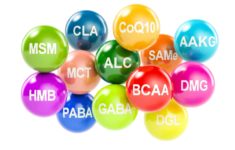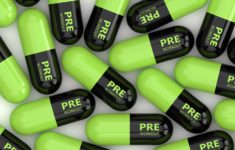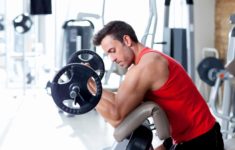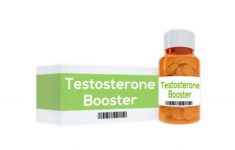Creatine is a natural substance found in your body and it consists of three amino acids (glycine, arginine and methionine).
The most popular form of creatine is called creatine monohydrate. If you choose to take a creatine supplement you need to be aware of what creatine cycle is and how it affects your body and your overall performance at the gym.
Many people use top quality creatine supplements to increase their muscle mass, energy, (and for many other benefits as well).
There are many types of creatine and each of them comes with its benefits and side effects. For example, there is a popular debate about the connection between creatine and hair loss.
Most of the effects (positive or negative) can be attributed to the amount of creatine you are taking as well as the amount of time you spend taking it.
The easiest way to explain creatine cycling is to say that it consists of different phases in which you are supposed to take different amounts of creatine.
The first part of creatine supplementation is called the loading phase. This phase lasts between 5-7 days, and its purpose is to increase creatine levels in your body [1]. While creatine loading you are supposed to take a dose of creatine (5 grams) 4 times per day.
During this phase, your creatine stores will fill up fast, and you may experience side effects like bloating water retention, or weight gain (due to water retention).
The best way to combat this is to increase the intake of water, or simply put, drink more water!
Now, as far as taking creatine goes, and should you do it, at the end of the day it’s all up to you.
If you want to increase your muscle gains, your energy and your overall workout performance, then you should absolutely do it!
Table of Contents
What Is Creatine Cycling?
Just like with anything that you are taking into your body, your body can build up a resistance to creatine.
As time passes the creatine benefits will reach their peak, and after it, the positive effects will start to diminish until they become nullified.
Usually, one creatine cycle lasts around 8 weeks. It consists of a loading phase (which we talked about), maintenance phase and do not take creatine for 2-4 weeks – phase.
The maintenance phase is the longest one (5-6 weeks) [2] and is the most responsible for increased muscle mass.
During maintenance, it’s recommended to take creatine in doses that do not exceed 10 grams per day.
The last part of supplementing with creatine is not supplementing with creatine (a pretty reasonable sentence, not confusing at all).
This part should last between 2-4 weeks, and in this period of time, you are advised to stop taking creatine to give your body a chance to get the creatine levels back to normal, so that when you decide to supplement again you could get the maximum benefits.
Why Do You Need to Cycle Creatine?
Creatine is one of the most tested supplements. It can be taken pre-workout or post-workout, depending on your preference.
Creatine is responsible for an increase in ATP-adenosine triphosphate levels [3]. High levels of ATP give you more energy during those gruelling workout sessions.
The reason for a creatine cycle is to give your body a chance to maximize the gains of using creatine as a supplement.
Daily use of anything will lead your body to a natural reaction of building up resistance to it.
If you want to get the best possible results, in the long term, while still getting to build and keep those glorious muscles, you should always take creatine in cycles.
How Long Should I Cycle Creatine For?
Is there such a thing as too much creatine? Well according to research there is. So, if you want to participate in creatine supplementation you should follow the recommended ways of using creatine.
To build muscles, the proper way, you may want to try the creatine cycle for a period of 4-5 weeks, if it’s your first time.
And an additional recommendation for first timers would be to just skip the loading phase and just start with the maintenance part of the creatine cycle.
Are You Supposed to Cycle off Creatine?
Creatine use will help you increase muscle. As reported by the International Society of Sports Nutrition, creatine supplementation should last up to 8 weeks [4].
After that, you should cycle off of creatine, which means that you should stop taking it for a period of 2-4 weeks.
Used in sports nutrition, creatine is the most tested supplement, but that does not mean that it should be taken lightly.
Having high levels of creatine in your muscles may be a good thing for some time, but after a while, they will hit a plateau which will lead to you not being able to properly build muscle and get the performance boost that you wanted.
The most common form of creatine used today is creatine monohydrate. But there are also different types that you could use, like creatine phosphate or creatine nitrate.
There are many debates about the best form of creatine. Creatine ethyl ester or magnesium chelate, creatine HCl vs. monohydrate, etc.
If you choose to supplement with creatine, first check with your doctor to see which type of it will be best suited for the exercise types and the results you are trying to achieve.
Do I Need to Load Creatine?
Creatine supplementation is just one of those things that spawn different answers to posed questions, depending on whom you ask.
Some people believe that you should not load creatine, because you could get the same improvement in results by taking smaller doses, daily.
The road may be longer, but at the end of it, your creatine stores will be full, all the same (there is a limit to them, and reaching that limit is the goal, not the time you take to do it).
Also, some people believe that creatine supplementation without loading is much safer for people who have underlying health problems.
By taking things slowly, you will get to experience how creatine affects your body so if any problem arises, the potential damage to your health will be minimal because your intake of it wasn’t excessive.
References
- https://www.maximuscle.com/nutrition/ingredients/creatine/Creatine-Loading/
- https://www.progenexusa.com/blogs/science/creatine-cycle-the-right-way
- https://www.ncbi.nlm.nih.gov/pmc/articles/PMC3963244/
- https://jissn.biomedcentral.com/articles/10.1186/s12970-017-0173-z






